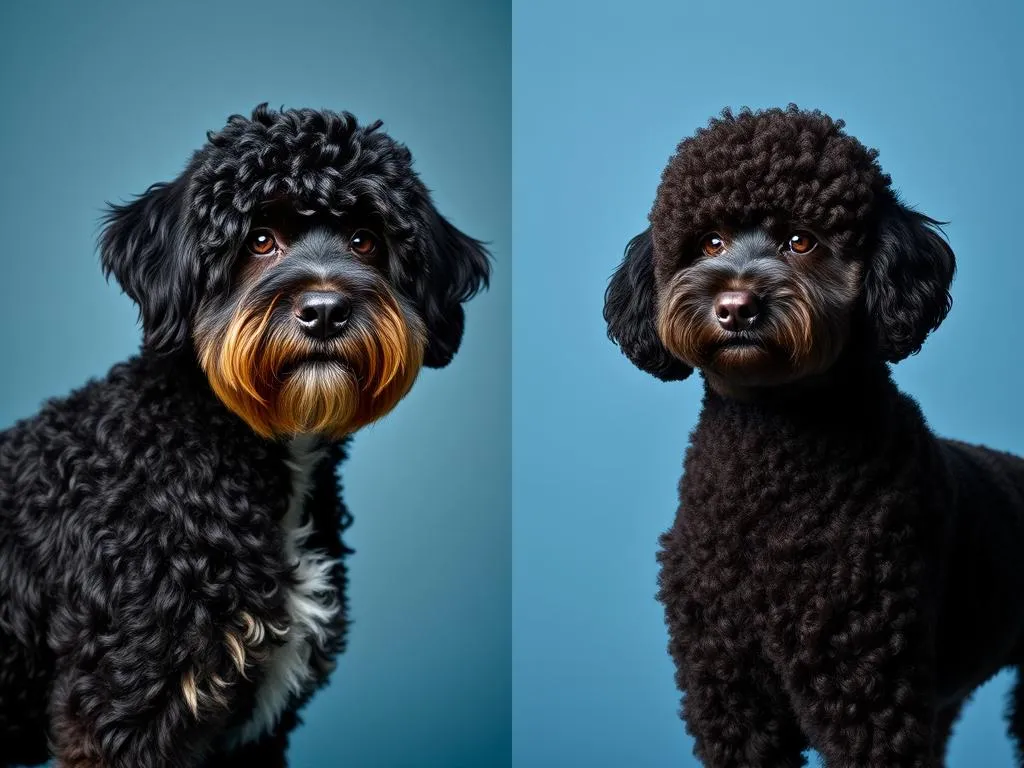
Choosing a dog breed is one of the most crucial decisions for prospective pet owners. Each breed comes with its own unique traits, advantages, and challenges, making it essential for individuals to thoroughly understand their options. In this article, we will delve into a detailed comparison of the Portuguese Water Dog and the Poodle. This analysis will help potential dog owners make informed decisions based on their lifestyles and preferences.
Overview of the Portuguese Water Dog
Breed History
The Portuguese Water Dog has a rich history that dates back several centuries. Originating in Portugal, these dogs were bred to assist fishermen in various tasks, such as herding fish into nets and retrieving gear from the water. Their historical significance lies in their ability to thrive in aquatic environments, making them invaluable companions to fishermen. The breed’s working nature has ensured that they remain active and intelligent, making them popular in modern households.
Physical Characteristics
The Portuguese Water Dog is a medium-sized breed, typically weighing between 35 to 60 pounds. They possess a distinctive coat that can be either curly or wavy, providing them with protection against cold water. One of the breed’s unique features is their webbed feet, which enhance their swimming abilities. Their coat is often hypoallergenic, making them a suitable choice for families with allergies.
Temperament and Behavior
These dogs are known for their friendly and intelligent nature. Portuguese Water Dogs are highly sociable and often form strong bonds with their families. They are particularly good with children and other pets, making them an excellent choice for family environments. However, they require regular socialization and mental stimulation to prevent boredom and undesirable behaviors.
Health Considerations
Like any breed, Portuguese Water Dogs are prone to certain health issues. Common concerns include hip dysplasia, progressive retinal atrophy, and certain skin conditions. Their lifespan typically ranges from 12 to 14 years. Regular veterinary check-ups, a balanced diet, and routine exercise are vital for maintaining their health.
Overview of the Poodle
Breed History
The Poodle is a breed that has an equally fascinating history. Originally bred in Germany as a water retriever, the Poodle gained immense popularity in France, where it was refined and developed into three distinct sizes: Standard, Miniature, and Toy. Historically, Poodles were known for their intelligence and versatility, serving as hunting companions, circus performers, and loyal family pets.
Physical Characteristics
Poodles come in three size variations, which makes them unique compared to other breeds. The Standard Poodle typically weighs between 40 to 70 pounds, the Miniature weighs around 10 to 15 pounds, and the Toy Poodle is usually between 4 to 6 pounds. They have a dense, curly coat that is also hypoallergenic, requiring regular grooming to prevent matting and maintain its appearance.
Temperament and Behavior
Poodles are celebrated for their intelligence and loyalty. They are eager to please, making them highly trainable. Poodles are generally friendly and sociable, thriving in family settings. They are also known to get along well with other pets and children, although their energy levels can vary by size. Standard Poodles, for example, may require more exercise than their smaller counterparts.
Health Considerations
Poodles are generally healthy, but they can be prone to specific health issues such as hip dysplasia, progressive retinal atrophy, and certain skin conditions. Their lifespan varies by size: Standard Poodles typically live 12 to 15 years, Miniature Poodles 12 to 14 years, and Toy Poodles can live up to 15 years or more. Regular vet visits and a proper diet are essential to ensure their well-being.
Side-by-Side Comparison: Portuguese Water Dog vs Poodle
Physical Attributes
When comparing the Portuguese Water Dog and the Poodle, physical attributes play a significant role. The Portuguese Water Dog is medium-sized with a sturdy build, while Poodles vary widely in size.
| Characteristic | Portuguese Water Dog | Poodle |
|---|---|---|
| Size | Medium (35-60 lbs) | Varies (4-70 lbs) |
| Coat Type | Curly/Wavy | Curly |
| Grooming Needs | Moderate | High (requires regular grooming) |
Both breeds boast hypoallergenic coats, which is a major plus for allergy sufferers; however, the Poodle’s grooming needs are more demanding due to their varied coat lengths.
Personality Traits
In terms of personality, both breeds are friendly and intelligent. The Portuguese Water Dog is known for its playful demeanor and love for water activities, while the Poodle is recognized for its exceptional trainability and versatility in various tasks.
| Trait | Portuguese Water Dog | Poodle |
|---|---|---|
| Intelligence | High | Very High |
| Sociability | Very Sociable | Highly Sociable |
| Trainability | Good (requires consistent training) | Excellent (eager to please) |
Both breeds thrive on positive reinforcement during training, making them enjoyable to teach.
Activity and Exercise Requirements
Both breeds have high energy levels, but the Portuguese Water Dog typically requires more rigorous exercise due to its working background.
| Activity Level | Portuguese Water Dog | Poodle |
|---|---|---|
| Daily Exercise | 60-90 minutes | 30-60 minutes (varies by size) |
| Recommended Activities | Swimming, fetch, agility | Obedience training, playtime |
Portuguese Water Dogs excel in activities that involve water, while Poodles enjoy a variety of activities, including agility and obedience training.
Health and Lifespan
When it comes to health, both breeds have their specific concerns.
| Health Aspect | Portuguese Water Dog | Poodle |
|---|---|---|
| Common Health Issues | Hip dysplasia, eye disorders | Hip dysplasia, skin conditions |
| Lifespan | 12-14 years | 12-15 years (varies by size) |
Preventative care strategies such as regular vet visits, proper nutrition, and routine exercise are essential for both breeds to ensure a long, healthy life.
Pros and Cons of Each Breed
Portuguese Water Dog
Advantages:
– Great for active families who enjoy outdoor activities.
– Hypoallergenic coat, suitable for allergy sufferers.
– Excellent swimmers and enjoy water activities.
Disadvantages:
– Requires regular grooming to maintain coat health.
– May need more training and socialization compared to other breeds.
Poodle
Advantages:
– Highly intelligent and adaptable to various living situations.
– Available in three sizes, making them suitable for different home environments.
– Hypoallergenic coat that requires grooming but is manageable.
Disadvantages:
– Higher grooming upkeep due to their curly coats.
– Can be prone to separation anxiety, especially in smaller sizes.
Which Dog is Right for You?
Assessing Your Lifestyle
Choosing between a Portuguese Water Dog and a Poodle involves assessing your lifestyle. Consider factors such as your living situation, activity level, and family dynamics. For instance, active families who enjoy outdoor activities may find the Portuguese Water Dog to be an excellent fit, while those living in smaller spaces might prefer the adaptability of a Poodle.
Matching Breed Traits to Owner Preferences
Understanding the traits of each breed is crucial in determining the best fit for your family. If you’re looking for a dog that enjoys water and outdoor activities, the Portuguese Water Dog is ideal. On the other hand, if you value intelligence and trainability, the Poodle may be more suited to your needs.
Making an Informed Decision
Researching and meeting potential pets before adoption plays a significant role in making an informed decision. Consider attending dog shows or visiting shelters to interact with both breeds. Understanding their temperaments and care needs will help you choose the right companion for your lifestyle.
Conclusion
In summary, both the Portuguese Water Dog and Poodle offer unique benefits and challenges. Understanding their differences and similarities can greatly assist prospective dog owners in making informed choices. It’s essential to consider your own needs and preferences in choosing a breed that will complement your lifestyle. Ultimately, responsible pet ownership and appreciation for each breed’s traits will lead to a fulfilling companionship for both you and your new furry friend.








